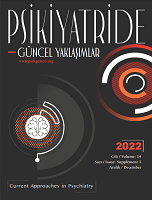Fear of Covid-19 and Subjectıve Well-Being: The Sequential Mediating Role of Cognitive Flexibility and Psychological Resilience
Fear of Covid-19 and Subjectıve Well-Being: The Sequential Mediating Role of Cognitive Flexibility and Psychological Resilience
Author(s): Ezgi Ekin Şahin, Berfin TöreSubject(s): Social psychology and group interaction, Clinical psychology, Behaviorism, Health and medicine and law
Published by: Çukurova Universitesi Tip Fakultesi Psikiyatri Anabilim Dalı
Keywords: COVID-19; well-being; psychological resilience; cognitive flexibility:
Summary/Abstract: The negative relationship between fear of COVID-19 and well-being has been revealed over the last years. However, the potential variables that affect this relationship need to be studied. This study examines the sequential mediating role of cognitive flexibility and psychological resilience in the relationship between fear of COVID-19 and subjective well-being. Six hundred and eight participants (339 females and 269 males, aged between 18-79 years) completed the Fear of COVID-19 Scale, the Brief Resilience Scale, the Cognitive Flexibility Inventory, the Positive and Negative Affect Schedule, and the Satisfaction with Life Scale online. The path analysis was conducted using PROCESS macro in the study. The sequential mediation analyses show that the control dimension of cognitive flexibility and psychological resilience fully mediate the relationship between fear of COVID-19 and subjective well-being. In other words, fear of COVID-19 indirectly affects subjective well-being via the control dimension of cognitive flexibility and psychological resilience. In order to restrain the adverse effects of COVID-19, individuals’ cognitive flexibility and psychological resilience levels should be increased to enhance their well-being.
Journal: Psikiyatride Güncel Yaklaşımlar
- Issue Year: 14/2022
- Issue No: Suppl. 1
- Page Range: 92-99
- Page Count: 8
- Language: English

